TRENDING...
Africa Wanderlust
Landlocked and in the center of Southern Africa, Zimbabwe has been an important trade center as well as the most strategic spot for British Settlement since the 18th century. This comprehensive Zimbabwe travel guide highlights the best of Zimbabwe.
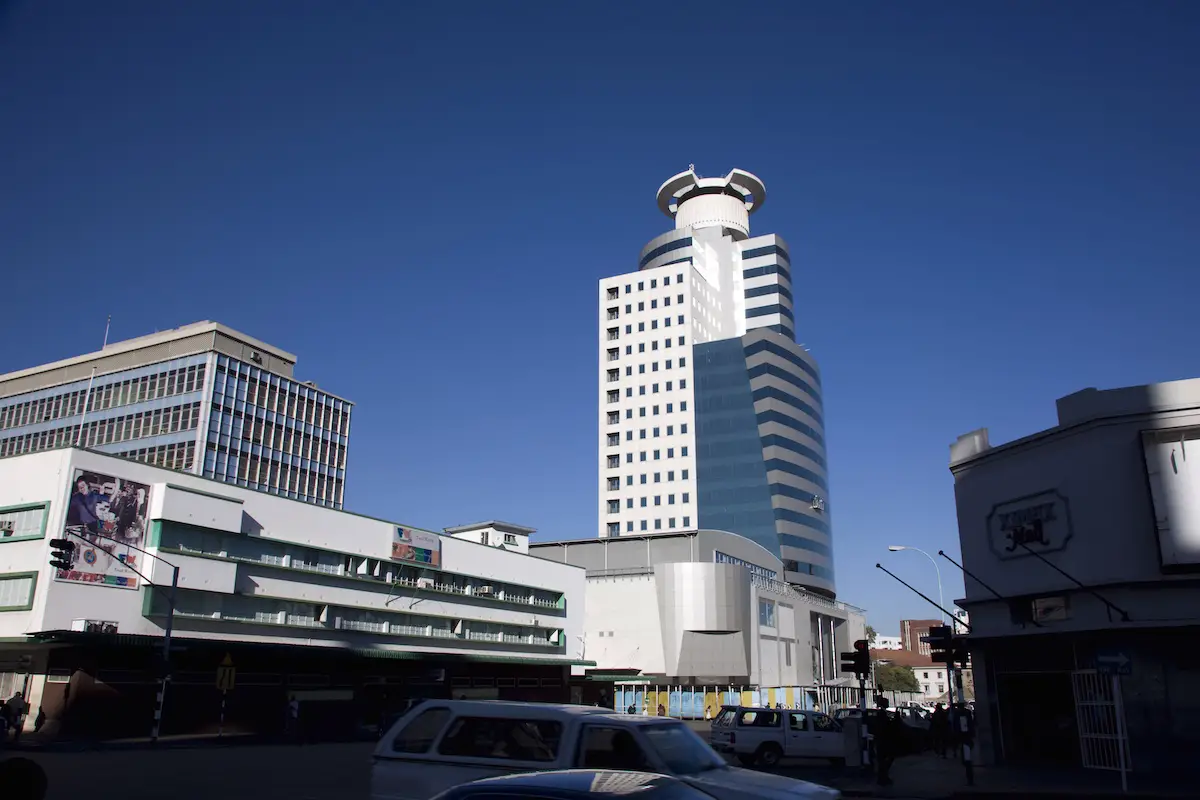
With the British politician and businessman conquering the territory and taking possession of the mines, the area was named Rhodesia by the Queen.
Initially founded as a British Colony called Southern Rhodesia, it gained independence in 1965 as Rhodesia. The following 15 years saw violent guerilla wars between the white minorities and black nationalists, which ended up in the foundation of the Republic of Zimbabwe in 1980.
Initially appointed as a prime minister, the longest-running president was Robert Mugabe from 1987 until his resignation in 2017. During his authoritarian rule, he was held accountable for the increased mortality rate as well as the declining life expectancy and economy.
In November 2017, his reign came to an end as he was put under house arrest after a coup d’etat. He was then replaced by the vice president Emmerson Mnangagwa. This created a tension between the supporters of Mugabe and those who opposed him.

Zimbabwe Travel Guide: Things to Do, Places to Stay, Culture, and Travel Tips
Capital: Harare Official languages: English, Shona, Ndebele, Southern Sotho, Tswana, Xhosa, Venda, Chewa, Tsonga, Tonga President: Emmerson Mnangagwa Currencies: United States Dollar, Indian rupee, Pound sterling, and more…
Plan a Trip to Zimbabwe
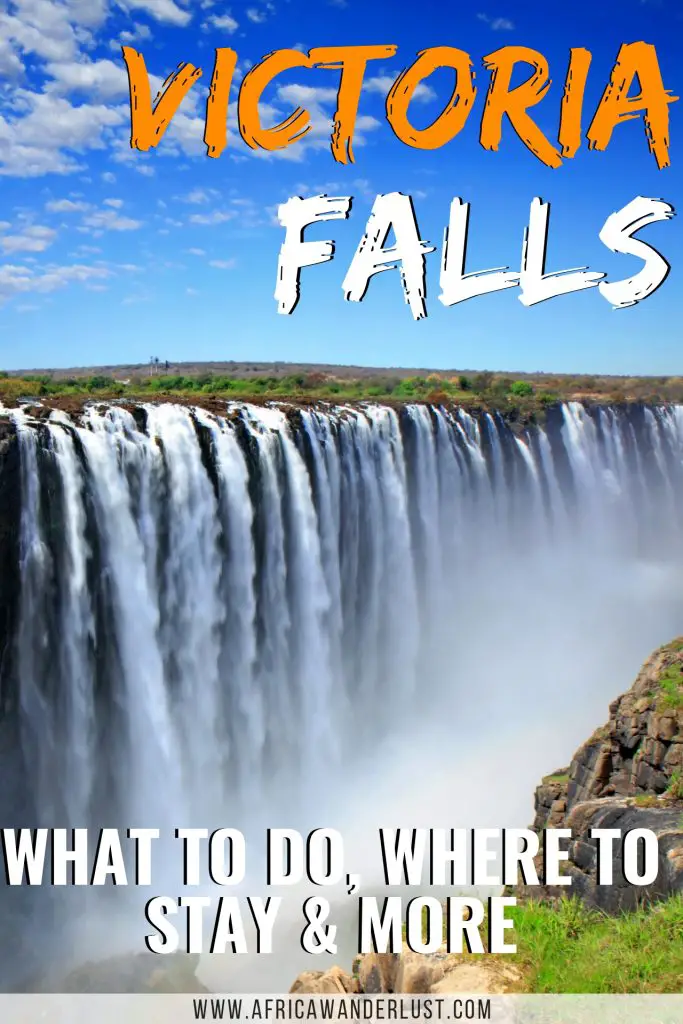
Points of Interest: Victoria Falls , Hwange National Park , Zimbabwe Ruins , and more… Average Flight Time: 24 h 30 min flight Fun Fact: Zimbabwe has not one but two largest water body in the world – Victoria Falls, the largest waterfall in the world, and Lake Kariba , the largest man-made lake in the world.
Why Visit Zimbabwe
Amongst all the political unrest, Zimbabwe’s touristic profile has been on a rapid decline. However, that is not to say that Zimbabwe has nothing to offer. On the contrary, the country has several tourist attractions and is one of the safest countries in Africa to visit .
[su_gmap address=”zimbabwe” zoom=”4″]
The magnificent Victoria Falls on the Zambezi River at the border between Zambia and Zimbabwe is the sole reason for visiting as one of the most popular natural wonders of the world. Furthermore, national parks like Hwange National Park and Nyanga National Park offer spectacular wildlife.
The country is also home to some of the most striking examples of Victorian dry stone architecture that can be observed in ancient cities. This travel guide will provide detailed information about Zimbabwe’s hidden gems.
Best of Zimbabwe
Best places to stay in zimbabwe.
#1 Victoria Falls Hotels
This Edwardian style hotel gives you a stunning view of Batoka Gorge with magnificent Victoria Falls only a short walk. The Victoria Falls Hotel features three restaurants, an amazing swimming pool, fitness center, and more.
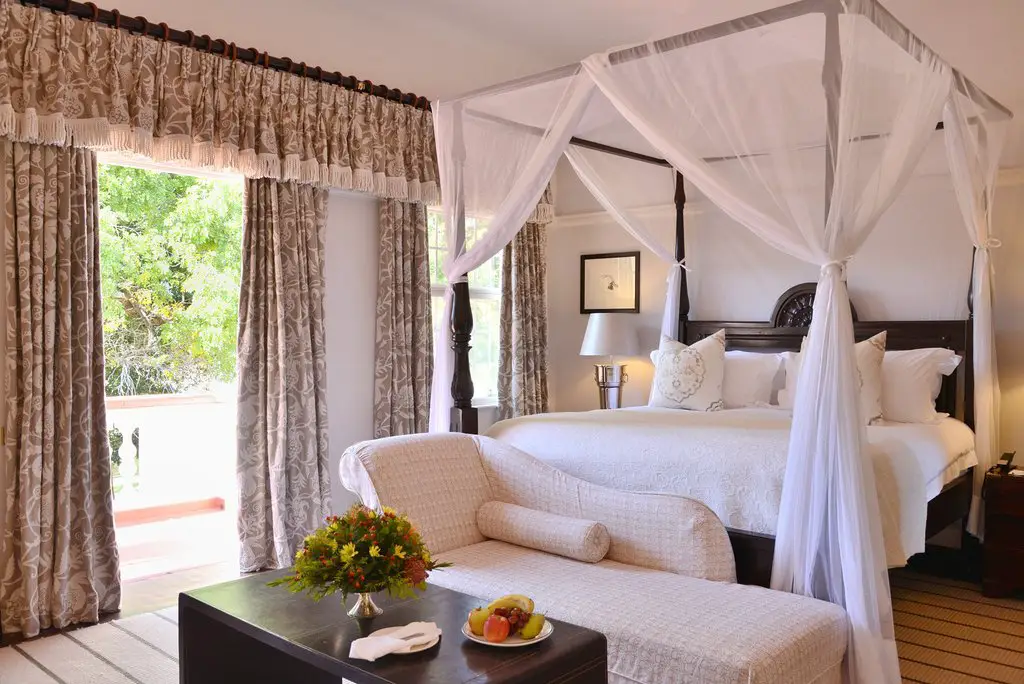
[su_button url=”https://fave.co/31htVs6″ target=”blank” background=”#0077be” color=”#ffffff” size=”6″ center=”yes” text_shadow=”0px 0px 0px ” rel=”nofollow”]CHECK PRICE[/su_button]
#2 Shearwater Explorers Village
Shearwater Explorers Village offers low-cost accommodation without compromising on style and comfort. And it’s no surprise that the Explorers Village is only 400 meters from the falls.
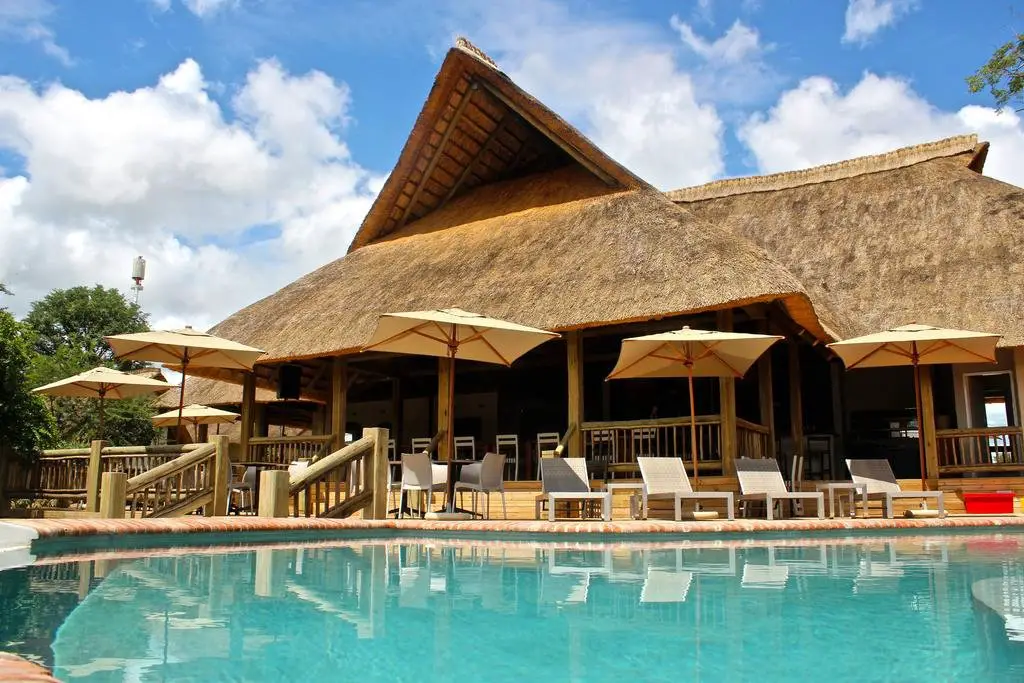
[su_button url=”https://fave.co/2A8q9oH” target=”blank” background=”#0077be” color=”#ffffff” size=”6″ center=”yes” text_shadow=”0px 0px 0px ” rel=”nofollow”]CHECK PRICE[/su_button]
#3 Victoria Falls Safari Lodge
The breathtaking Victoria Falls Safari Lodge offers easy access to Victoria Falls, a natural wonder of the world. Overlooking the Zambezi National Park, this safari lodge features a restaurant, Buffalo bar overlooking a waterhole, and more. It’s no wonder the Victoria Falls Safari Lodge has been voted 20 years in a row as the best safari lodge.
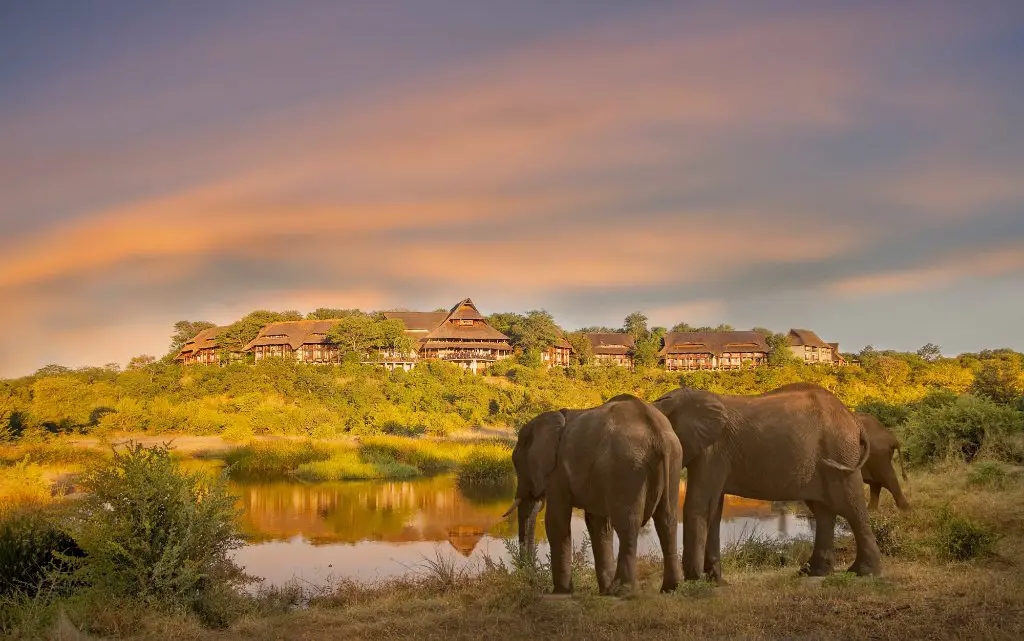
[su_button url=”https://fave.co/2Ag8U4R” target=”blank” background=”#0077be” color=”#ffffff” size=”6″ center=”yes” text_shadow=”0px 0px 0px ” rel=”nofollow”]CHECK PRICE[/su_button]
#4 Meikles Hotel
This 5-star luxury hotel is located in the Central Business District and features a large pool, airport transportation, fitness center, and even babysitting service. A 2013 revitalization renewed the charm of the legendary hotel.
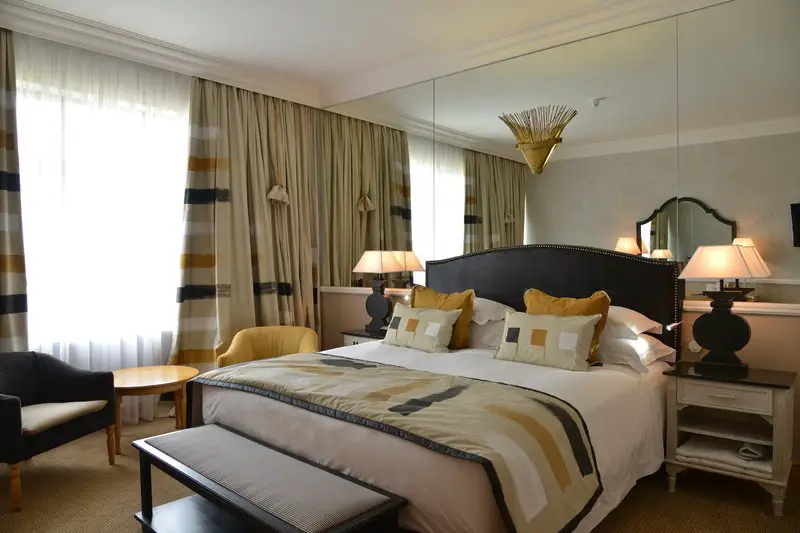
[su_button url=”https://fave.co/31eoZnP” target=”blank” background=”#0077be” color=”#ffffff” size=”6″ center=”yes” text_shadow=”0px 0px 0px ” rel=”nofollow”]CHECK PRICE[/su_button]
#5 Rainbow Towers Hotel And Conference Center
Located in the business district of Harare, the Rainbow Towers Hotel and Conference Centre offers access to the business center, fitness center, elaborate pool and bar area and more.
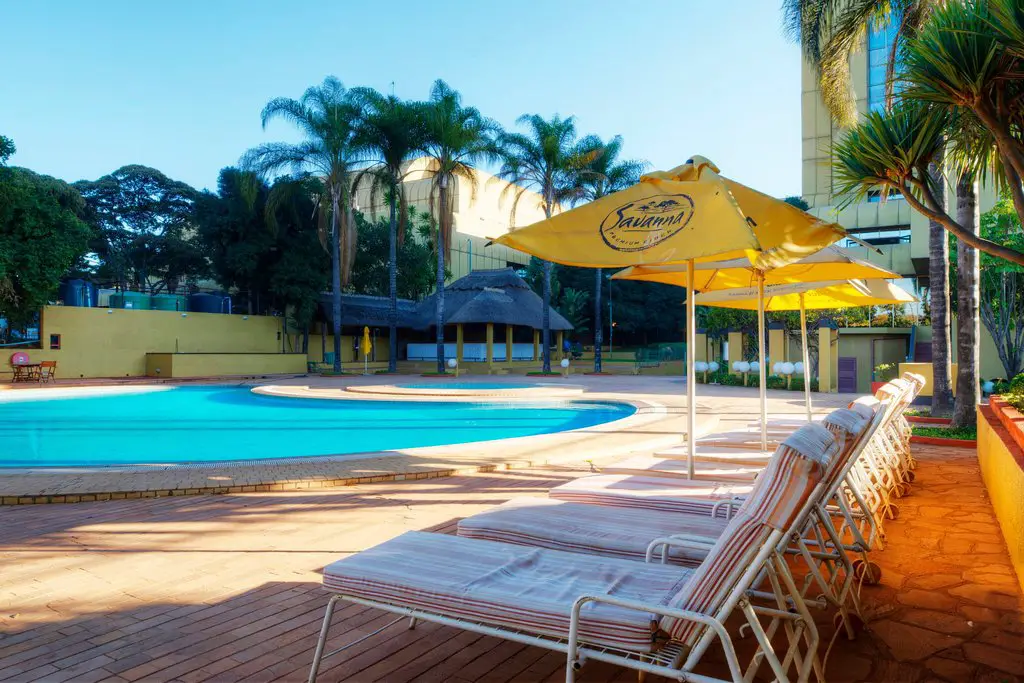
[su_button url=”https://fave.co/2I2nhOz” target=”blank” background=”#0077be” color=”#ffffff” size=”6″ center=”yes” text_shadow=”0px 0px 0px ” rel=”nofollow”]CHECK PRICE[/su_button]
Best Things to Do in Zimbabwe
#1 Safari in the Zimbabwe National Parks
An African adventure can never be complete without a safari. The two most significant Zimbabwe national parks are Hwange and Matopos. These African national parks offer an exciting collection of animal encounters, game drives, and walking safaris are both possible in these destinations.
#2 Visit the Great Zimbabwe Ruins
Zimbabwe’s cultural heritage from the Medieval Era is surprisingly intact, especially the Great Zimbabwe Ruins near Lake Mutirikwe. The ancient capital of the Kingdom of Zimbabwe has ancient ruins dating back to the 11th- 15th centuries, consisting of distinct dry-stone houses.
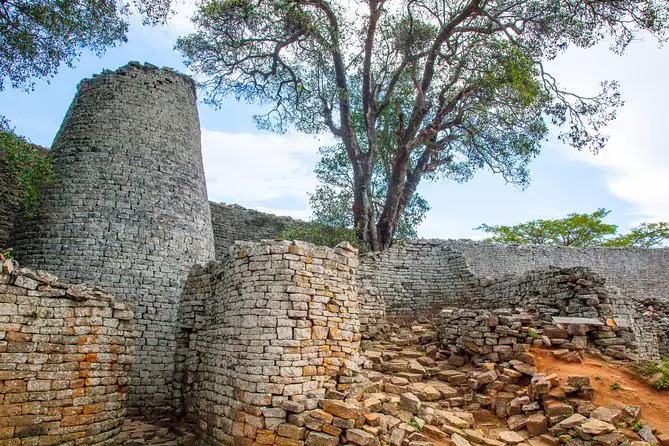
This UNESCO Heritage Site is one of the biggest ancient cities you will ever see in African countries.
#3 Watersports Around Zambezi River
The Great Zambezi River at the border of Zimbabwe and Zambia is the source of both the famous Victoria Falls and many adventurous water sports around the area. You can participate in activities from fishing to rafting and rock-climbing.
[su_button url=”https://fave.co/31qW1Rq” target=”blank” background=”#0077be” color=”#ffffff” size=”6″ center=”yes” text_shadow=”0px 0px 0px ” rel=”nofollow”]VIEW TOURS & ACTIVITIES[/su_button]
Best Things to See in Zimbabwe
#1 Victoria Falls
The Smoke That Thunders, Victoria Falls is considered the largest sheet of falling water in the world. With a height of 108 meters, it is twice as high as Niagara Falls.
The picturesque waterfall and the surrounding Victoria Falls National Park is a massive wildlife area and a rich rainforest.
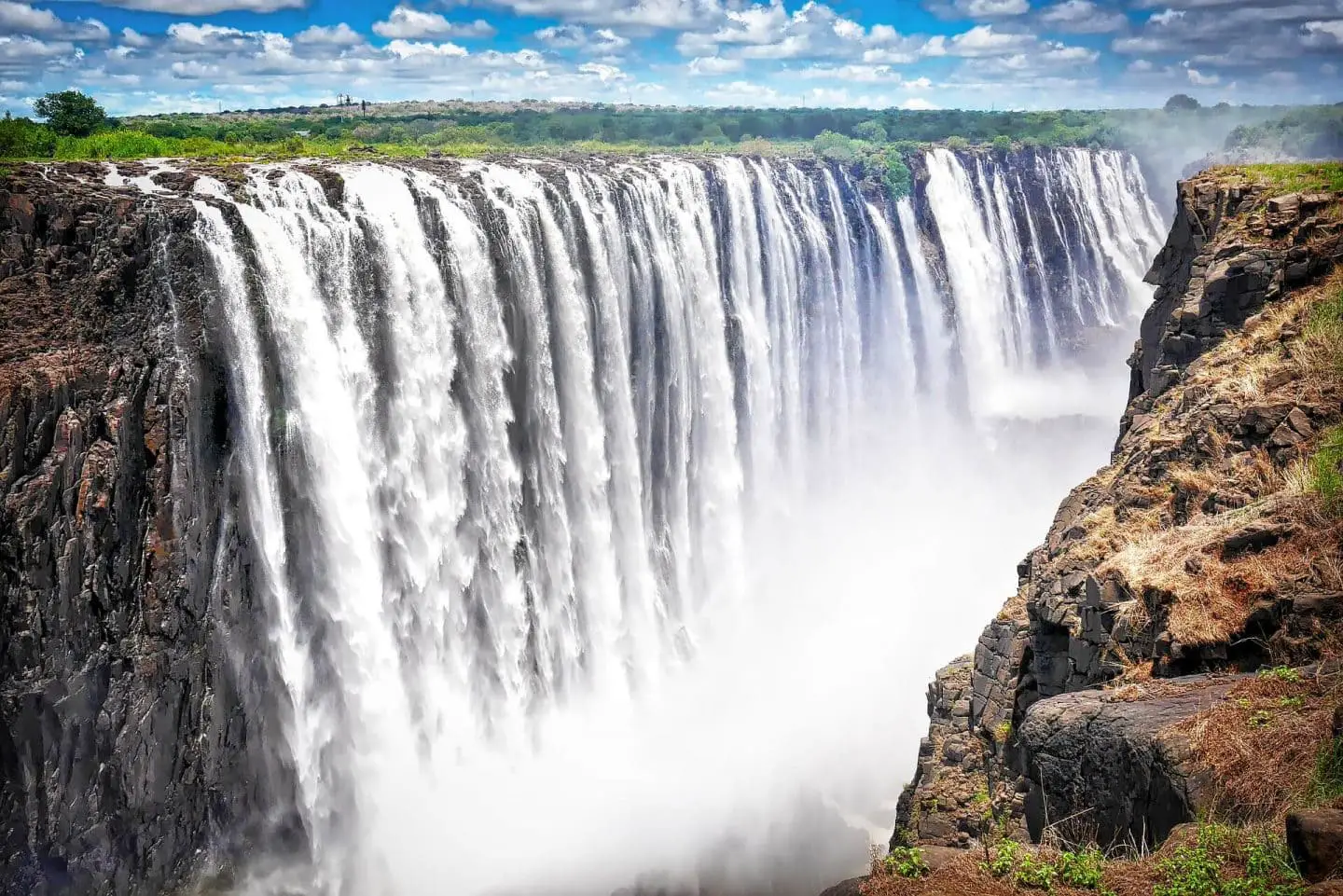
Although the Zambian Site is more touristic nowadays thanks to the town Livingstone, you should not underestimate the Zimbabwean side.
#2 Granitic Boulders at Matapos National Park
Matabo National Park is well-known for its granitic boulders where you will feel like you are on another planet. Not only these rock formations picturesque, but they are also historically valuable for the Bushmen paintings that they preserved.
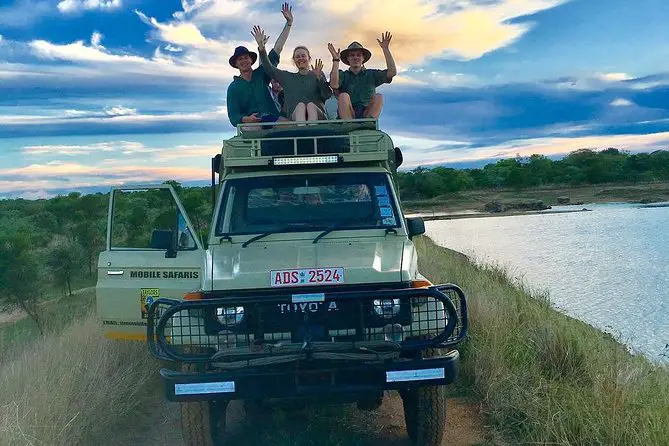
#3 Bulawayo and Mutare Town
Zimbabwe’s historic towns will impress you with their quaint atmosphere and vintage architecture.
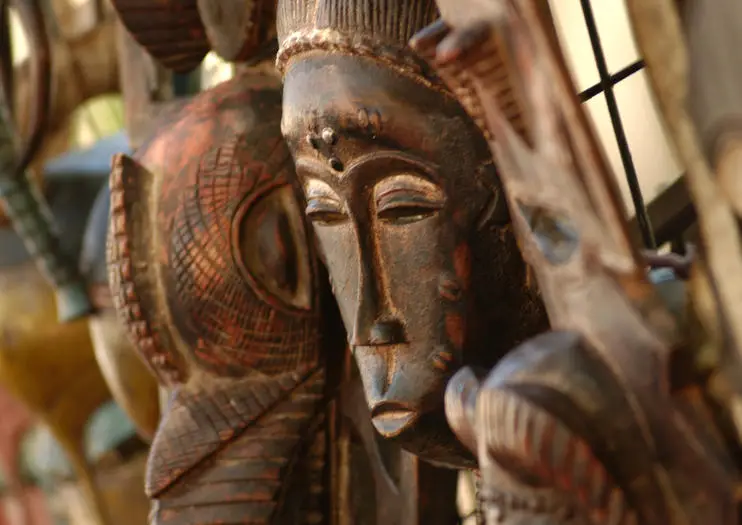
Bulawayo’s National Museum and the Railway Museum are very informative about the country’s history. Mutare Town is another successful demonstration of Zimbabwean culture and art.
We have more ideas on 9+ absolute best things to see and do in Zimbabwe. You will love #5.
[su_button url=”https://fave.co/31qW1Rq” target=”blank” background=”#0077be” color=”#ffffff” size=”6″ center=”yes” text_shadow=”0px 0px 0px ” rel=”nofollow”]MORE THINGS TO DO[/su_button]
Best Places to Eat in Zimbabwe
#1 Amanzi Restaurant
#2 Victoria 22 Restaurant
#3 Alo Alo Restaurant
Typical Costs
Average Flight Cost: $925 – 1,400 Set low fare price alert for Zimbabwe!
Accommodation
Camping: $7-8 per person per night Guesthouse: $20 – $50 per night for a standard room Hotel: $50 – $150 per night
Local meal: $5 – $7 Meals at a popular restaurant: $10 – $25 Beer: $2 – $3 Bottle of Water: $0.7 Bottle of Coke: $1
Transportation
Intercape Bus from Harare to Bulawayo: $30 1-2 hours of bus ride within the cities: $10 – $12 Hiring a private taxi: $50 – $80 per day
Victoria Falls Entrance Fee: $30 Matopos Entrance Fee: $15 The Great Zimbabwe Ruins Entrance Fee: $15 Game drive in national parks: $40 per person All-inclusive safari (accommodation, meals, activities): $600 – $800
Total Travel Cost
Expect to spend between on average between $1,500 to $2,500 depending on the number of days you plan on visiting the country. The cost of a luxury trip is two to three times the average cost, and for budget-friendly or backpackers, spending under $1,500 is very realistic.
Zimbabwe Travel Tips
Weather in zimbabwe.
The winter or wet season is from November to April with peak rainfall in March and April. From July to October is the summer or dry season with mostly sunny days and cold nights.
Best Months to Visit (When to Visit)
The peak season starts in July and continues until September. This time of the year is a popular time to visit Zimbabwe because wildlife viewing is the easiest. It is also the ideal time for canoeing and rafting in the Zambezi River. However, it is also much more crowded compared to the rest of the year, so you might want to wait for October for the tourists to go back to their 9-5 jobs.
How to Save Money in Zimbabwe
- Besides the Small World Backpackers Lodge in Harare and Shoestrings in Victoria Falls, the backpacker scene hasn’t developed much. The other cheap form of accommodation is camping. It is best to bring your own tent, as you might not always find spare tents at the campsite.
- Instead of using luxury buses like Intercape, you can use the local buses between cities to save up on transportation.
- Visiting during the winter (wet) season will save you between $500 to $1,500 on flight and accommodation.
Safety Tips: What You Need to Know About Zimbabwe Travel
- The political unrest is still ongoing in the big cities, even after the resignation of President Mugabe. There might be occasional violent protests, especially in Harare.
- Petty theft is common in the cities, so do not go out alone at night. Also, try not to flash your valuables or look like a confused tourist with a map on one hand and a safari hat on the other.
- You must not disturb/feed/engage with the animals during the safari drives. This is critical both for your own safety and for the well-being and comfort of the animals.
- Zimbabwe is a Malaria-risk region, so we suggest that you consult your practitioner before you travel. For detailed information on vaccinations needed, visit here .
Culture & Customs
Zimbabwe has 16 official languages: Chewa, Chibarwe, English, Kalanga, Khoisan, Nambya, Ndau, Ndebele, Shangani, Shona, sign language, Sotho, Tonga, Tswana, Venda, and Xhosa.
The three most common ones are Shona, Nbedele, and English. The white farmers, who are a minority in the country, also speak Afrikaans and some European languages.
The most common currencies are Zimbabwe Dollars and US Dollars as the primary foreign currency. For detailed information about the exchange rates and how tourists can pay, visit here .
It’s customary to leave a 10% tip at the restaurants, as well as giving $1-2 to the car guards. Safari guides will also appreciate tips as well.
There are abundant of wildlife to view in Zimbabwe at the national parks or on game reserves. Ever since the Wildlife Conservation Act in 1960, the wildlife in this Southern African country has shown significant improvement.
There is an increasing population of buffalo, elephant, rhinoceros, giraffe, leopard, lion, zebra, and antelope around the country.
Getting Around Zimbabwe
Surprisingly, you have access to trains between the main tourist destinations . The most popular train route is between Bulawayo and Victoria Falls through Hwange National Park.
There are two types of buses: The Intercape and the local buses. The latter is cheaper and much less comfortable. See the travel costs section for transportation price information.
Private shuttle and road transfer companies like Wild Horizons and Safari Logistics provide comfortable transportation to the national parks.
Entry & Exit Requirements
To visit Zimbabwe, you will need a passport that is valid for at least 6 months on the date of entry. Reservations, travel insurance and return tickets are also required.
There are three types of scenarios for Zimbabwe visa requirements , depending on your home country:
- You don’t need a visa (including SADC countries like South Africa)
- You can obtain a visa on arrival
- You have to apply for a visa beforehand.
For the lists of countries in all three categories, visit here .
Individuals from certain countries can obtain Univisa, which allows them to travel to both Zimbabwe and Zambia for $50. This can be purchased at Victoria Falls or David Livingstone Airport. Check here for the list of eligible countries.
We hope you found our detailed Zimbabwe travel guide helpful. To help you get started on your trip, check out our travel guides , Zimbabwe Packing List , and the additional resources below.
Love it? Pin it!
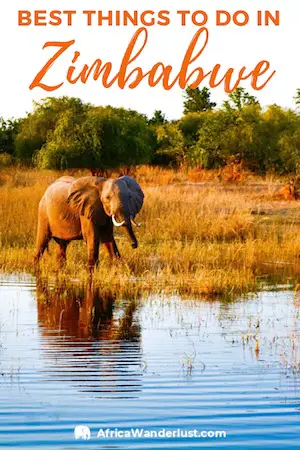
Related Articles for Zimbabwe
[su_posts posts_per_page=”-1″ tax_term=”49″ order=”asc” orderby=”rand”]
Winter is here! Check out the winter wonderlands at these 5 amazing winter destinations in Montana
- Travel Destinations
- Africa & Middle East
The Ultimate Zimbabwe Travel Guide
Published: October 15, 2023
Modified: January 3, 2024
by Olivette West
- Plan Your Trip
- Travel Guide
Introduction
Welcome to Zimbabwe, a country steeped in rich history, vibrant culture, and breathtaking natural beauty. Nestled in the southern part of Africa, Zimbabwe is a landlocked country known for its stunning landscapes, diverse wildlife, and warm hospitality. With a blend of traditional African charm and modern amenities, Zimbabwe offers an array of experiences for every type of traveler.
Home to the majestic Victoria Falls, also known as “The Smoke That Thunders,” Zimbabwe boasts one of the Seven Natural Wonders of the World. This awe-inspiring waterfall is a must-see attraction, drawing visitors from around the globe. But Zimbabwe’s allure extends beyond the iconic falls, as it is also home to vast national parks, rugged mountains, picturesque lakes, and ancient ruins.
Getting to Zimbabwe is relatively easy, with international flights arriving at the capital city of Harare or the tourism hub of Victoria Falls. Once here, visitors can explore the country’s diverse landscapes, encounter the Big Five on a thrilling safari, delve into the intricacies of ancient civilizations, or simply unwind in the tranquility of the Zimbabwean countryside.
Whether you’re an adventure seeker, a wildlife enthusiast, a history buff, or a curious explorer, Zimbabwe offers a myriad of experiences to satisfy your wanderlust. From adrenaline-pumping activities such as bungee jumping and white-water rafting, to exploring ancient ruins and interacting with local communities, there is something for everyone.
In this comprehensive travel guide, we will delve into the various aspects of visiting Zimbabwe, including visa requirements, the best time to visit, currency information, transportation options, accommodation choices, top tourist attractions, cultural experiences, adventure activities, shopping opportunities, and much more. So, let’s embark on a journey to discover the wonders of Zimbabwe!
Getting to Zimbabwe
Getting to Zimbabwe is convenient and accessible, with international flights connecting the country to major cities around the world. The primary international airports in Zimbabwe are Harare International Airport (HRE) and Victoria Falls International Airport (VFA).
If you are flying from Europe, Asia, or the Americas, you are likely to have a layover in a major hub city such as Johannesburg, Nairobi, or Dubai before continuing on to Zimbabwe. Airlines such as South African Airways, Emirates, Ethiopian Airlines, and Kenya Airways operate frequent flights to Zimbabwe.
For those traveling from neighboring African countries, there are also several regional airlines that offer direct flights to Zimbabwe. These include Air Zimbabwe, Fastjet, and South African Express, among others.
Once you arrive at either Harare or Victoria Falls airport, you can easily reach your final destination within the country. There are domestic flights connecting major cities and tourist destinations, including Harare, Bulawayo, and Victoria Falls. Domestic airlines such as Air Zimbabwe and Fastjet operate regular flights within the country.
In addition to air travel, there are also land border crossings available for those traveling by road. Zimbabwe shares borders with South Africa, Botswana, Mozambique, and Zambia, making it possible to enter the country via road. However, it is important to check the visa requirements and border regulations before undertaking a road trip to Zimbabwe.
For those seeking a more adventurous journey, there are also train options available. The popular “Zambezi Express” train operates between Victoria Falls and Bulawayo, providing a scenic and nostalgic way to explore the country. It is advisable to book train tickets in advance, as availability may be limited.
Overall, getting to Zimbabwe is relatively straightforward, with various transportation options available. Whether you choose to fly, drive, or take a train, the journey to Zimbabwe is part of the experience, offering glimpses of the country’s diverse landscapes and welcoming atmosphere.
Visa Requirements
Before planning your trip to Zimbabwe, it is essential to understand the visa requirements to ensure a smooth and hassle-free entry into the country. The visa regulations for Zimbabwe vary depending on your nationality, intended length of stay, and purpose of travel.
Visitors from most countries are required to obtain a visa prior to their arrival in Zimbabwe. The easiest and most common way to obtain a visa is by applying for an e-Visa online through the government’s official website or through authorized visa processing agencies. The e-Visa system allows you to apply, pay, and receive your visa electronically, eliminating the need for physical documents and the hassle of visiting an embassy or consulate.
There are different types of visas available depending on the purpose of your visit. The most common types of visas for tourists are the Single Entry Visa and the Kaza Univisa, which allows travel between Zimbabwe and Zambia. The Kaza Univisa is particularly useful for those planning to visit both countries, as it offers the convenience of a single visa for multiple entries within a specified period.
It is important to check the official government websites or consult with the Zimbabwean embassy or consulate in your home country to determine the specific visa requirements for your nationality. The visa fees, required documents, and processing times may vary, so it is advisable to start the application process well in advance of your planned travel dates.
When applying for a visa, be prepared to provide your passport details, travel itinerary, proof of accommodation, and sufficient funds to support your stay in Zimbabwe. Some nationalities may also require additional documents, such as a letter of invitation or a yellow fever vaccination certificate.
Upon arrival at the designated ports of entry, such as airports or land border crossings, you will be required to present your valid passport with the visa. Immigration officials may also ask for proof of return or onward travel, so it is important to have your travel documents readily available.
It is worth noting that visa regulations are subject to change, so it is always a good idea to double-check the requirements closer to your travel date to ensure compliance. By familiarizing yourself with the visa requirements and preparing the necessary documents in advance, you can ensure a smooth entry into Zimbabwe and focus on enjoying your time in this captivating country.
Best Time to Visit Zimbabwe
Zimbabwe enjoys a pleasant subtropical climate, making it a year-round destination. However, the best time to visit Zimbabwe largely depends on your interests and the type of experience you are seeking.
From April to October, Zimbabwe experiences its dry season, which is considered the peak tourist season. During this time, the weather is mild and dry, making it ideal for wildlife viewing and outdoor activities. The months of July to September are particularly popular, as they offer optimal game viewing opportunities in national parks such as Hwange and Mana Pools. It is important to note that the dry season coincides with Zimbabwe’s winter, so early mornings and evenings can be quite chilly. Be sure to pack warm clothing if you are visiting during this period.
If witnessing the magnificent Victoria Falls in all its glory is on your bucket list, consider visiting between February and May. This period follows the rainy season, and the falls are at their most spectacular with a massive flow of water. The mist created by the falls can be intense, so be prepared to get wet and don’t forget to bring a raincoat or poncho.
For bird enthusiasts, the wet season from November to March offers the best opportunities for bird-watching. During this time, the vegetation is lush and vibrant, attracting a colorful array of bird species. The wet season is also considered the shoulder or low season, and you can expect fewer crowds and lower prices on accommodation and tours.
It’s worth noting that wildlife sightings can still be rewarding during the wet season, as the landscapes transform into lush green havens. Many animals give birth during this time, and birdlife is abundant. However, it is important to be prepared for occasional rain showers and muddy conditions when exploring national parks and game reserves.
Ultimately, the best time to visit Zimbabwe depends on your preferences and the experiences you wish to have. Whether you’re seeking optimal wildlife encounters, want to witness the power of Victoria Falls, or simply want to enjoy Zimbabwe’s natural beauty, there is a time of year that will suit your desires. Be sure to plan ahead and consider the weather patterns and activities that interest you most to make the most of your visit to Zimbabwe.
Currency and Money Matters
The official currency of Zimbabwe is the Zimbabwean Dollar (ZWL). In recent years, Zimbabwe has transitioned from using foreign currencies, such as the US Dollar and South African Rand, to reintroducing its own currency. It is important to note that foreign currencies, particularly the US Dollar, are still widely accepted in Zimbabwe for transactions.
When it comes to accessing money during your visit to Zimbabwe, it is recommended to carry a combination of cash and debit/credit cards. While cards are accepted at most hotels, restaurants, and larger establishments in major cities like Harare and Victoria Falls, cash is still king in many rural areas and smaller towns.
Exchanging foreign currency into Zimbabwean Dollars can be done at banks, authorized exchange bureaus, or even hotels. It is advisable to use official exchange facilities to avoid scams and ensure you receive a fair rate. It is also recommended to exchange a sufficient amount of currency upon arrival, as remote areas might have limited exchange options.
ATMs are readily available in urban centers, and most accept Visa and MasterCard. However, it is important to be aware that power cuts and network connectivity issues can sometimes affect ATM functionality. Always carry some cash as a backup, especially if you plan on exploring more remote regions.
Keep in mind that tipping is customary in Zimbabwe, particularly for exceptional service. It is customary to tip hotel staff, safari guides, and restaurant servers. A general guideline is to tip around 10% of the bill, but feel free to tip more if you feel the service was exceptional.
It is also important to note that while Zimbabwe is a relatively safe country, it is always wise to take precautions when it comes to money. Avoid displaying large sums of cash in public, keep valuable items secure, and be vigilant when conducting financial transactions.
Before traveling to Zimbabwe, it is advisable to check with your local bank regarding any travel advisories or restrictions on your debit/credit card usage. Some banks may require you to inform them of your travel plans to avoid any potential blockages on your card for security reasons.
By familiarizing yourself with the currency and money matters in Zimbabwe and planning ahead, you can ensure a smooth and hassle-free financial experience during your visit to this captivating country.
Language and Communication
The official language of Zimbabwe is English, inherited from the country’s colonial history. English is widely spoken and understood, particularly in urban areas, major tourist destinations, and among the educated population. As a result, communication with locals and navigating the country should generally not pose a language barrier for English-speaking visitors.
In addition to English, there are also several indigenous languages spoken in Zimbabwe. The most widely spoken local language is Shona, which is predominantly spoken in the eastern and central parts of the country. Another prominent language is Ndebele, spoken primarily in the western regions and around Bulawayo. Understanding a few basic greetings and phrases in Shona or Ndebele can go a long way in fostering connections and showing respect to the local culture.
When it comes to communication, it is worth noting that internet connectivity and access to mobile networks have significantly improved in recent years. Major cities and tourist areas generally have reliable internet coverage, and most hotels, cafes, and restaurants offer Wi-Fi for guests. However, in more remote areas, internet access may be limited or unreliable.
For international travelers, it is advisable to check with your mobile service provider regarding roaming options and international calling rates. Purchasing a local SIM card upon arrival is an affordable option for staying connected during your time in Zimbabwe. There are several mobile network operators in the country, including Econet, NetOne, and Telecel, offering various data and calling packages.
In terms of etiquette, Zimbabweans are known for their friendly and welcoming nature. It is customary to greet people with a warm “hello” or “good morning/afternoon” when entering establishments or interacting with locals. Handshakes are the most common form of greeting, although some Zimbabweans may also opt for a nod or a slight bow.
Communication with the local people can provide valuable insights into their culture, traditions, and way of life. Engaging in polite conversations and showing genuine interest in Zimbabwe’s rich history and cultural heritage can often lead to memorable interactions and create meaningful connections.
By embracing the linguistic diversity of Zimbabwe and making an effort to communicate respectfully, you can enhance your travel experience and forge lasting memories in this captivating country.

Health and Safety Tips
When traveling to Zimbabwe, it is important to prioritize your health and safety to ensure a positive and stress-free experience. Here are some essential health and safety tips to keep in mind:
1. Vaccinations: Before your trip, consult with a healthcare professional or travel clinic to determine which vaccinations are recommended for Zimbabwe. Common vaccinations include those for hepatitis A and B, typhoid, rabies, and yellow fever. Additionally, make sure your routine vaccinations, such as measles, mumps, and rubella (MMR) and tetanus, are up to date.
2. Malaria Prevention: Zimbabwe is located in a malaria-endemic region, particularly in rural and bush areas. It is advisable to take malaria prophylaxis medication and practice mosquito bite prevention measures, such as using insect repellent, wearing long sleeves and pants, and sleeping under bed nets or in air-conditioned rooms.
3. Safe Food and Water: To avoid gastrointestinal issues, it is recommended to drink bottled or purified water and avoid consuming untreated tap water or ice cubes. Be cautious when eating street food and opt for freshly cooked and hot meals. Wash your hands regularly or use hand sanitizer before meals.
4. Sun Protection: Zimbabwe experiences high levels of sun exposure, especially during the summer months. Protect yourself from the sun by wearing sunscreen (SPF 30+), a wide-brimmed hat, sunglasses, and lightweight, protective clothing. Stay hydrated by drinking plenty of water, especially during outdoor activities.
5. Travel Insurance: It is essential to have comprehensive travel insurance that covers medical expenses, emergency medical evacuation, personal liability, and trip cancellation or interruption. Ensure that your insurance policy covers the activities and destinations you plan to engage in during your visit to Zimbabwe.
6. Personal Safety: Zimbabwe is generally a safe country for tourists. However, it is always important to exercise caution and be aware of your surroundings. Avoid displaying valuable items or large amounts of cash in public. Use reputable transportation services and be cautious when walking alone at night. It is advisable to leave your passport and important documents securely locked at your accommodation and carry a photocopy of your passport for identification purposes.
7. Wildlife Encounters: Zimbabwe is renowned for its remarkable wildlife. When on safari or visiting game reserves, follow the instructions of professional guides and stay inside designated viewing areas. Maintain a safe distance from wild animals and avoid feeding or approaching them, as this can be dangerous.
8. COVID-19 Precautions: Stay informed about the latest COVID-19 travel restrictions, health protocols, and guidelines issued by the Zimbabwean government and international health organizations. Follow the recommended precautions, including wearing masks, practicing social distancing, and regularly sanitizing your hands.
Prioritizing your health and safety during your visit to Zimbabwe will contribute to a worry-free and enjoyable experience. By taking necessary precautions and heeding local advice, you can immerse yourself in the beauty and wonder of this diverse African destination.
Transportation in Zimbabwe
Getting around Zimbabwe is relatively convenient, with various transportation options available to suit every traveler’s needs. Here are the main modes of transportation to consider when exploring this captivating country:
1. Domestic Flights: Zimbabwe has a well-connected domestic flight network, with flights operating between major cities and tourist hubs. Air Zimbabwe and Fastjet are the primary domestic airlines offering regular flights. This is a convenient option for covering long distances quickly and efficiently, particularly if you have limited time.
2. Road Travel: Zimbabwe has an extensive road network, making it possible to explore the country by car or bus. Car rental services are available in major cities, but it is important to familiarize yourself with local road rules and drive defensively. Public buses and minivans (known as “kombis”) are popular modes of transport for shorter distances and are a wallet-friendly option for budget travelers.
3. Taxis and Rideshares: Taxis are readily available in urban areas and can be hailed on the street or booked through local taxi companies. Agree on the fare before starting the journey or ensure that the meter is used. Rideshare services like Uber are also available in major cities, providing a convenient and reliable transportation option.
4. Trains: Traveling by train in Zimbabwe offers a nostalgic and scenic experience. The “Zambezi Express” is a popular train service operating between Victoria Falls and Bulawayo, allowing passengers to admire the country’s picturesque landscapes from the comfort of a vintage-style train. It is advisable to book train tickets in advance, as availability can be limited.
5. Organized Tours: Joining organized tours and safaris is an excellent way to explore Zimbabwe’s national parks, wildlife reserves, and cultural attractions. These tours often include transportation, accommodations, and the expertise of experienced guides, eliminating the hassle of planning and navigating on your own.
When traveling within Zimbabwe, it is important to consider factors such as distance, road conditions, and travel times. While major roads are generally well-maintained, some rural areas may have unpaved or poorly maintained roads. Plan your itineraries accordingly and allow for additional travel time if necessary.
It is worth noting that public transportation schedules may vary, especially in more remote areas. It is advisable to check departure times in advance and be prepared for potential delays. Additionally, be cautious when using public transportation and keep a close eye on your belongings to minimize the risk of theft.
Overall, the transportation options in Zimbabwe cater to the diverse needs of travelers. Whether you prefer the convenience of flying, the flexibility of driving, or the adventure of train travel, you will find a suitable mode of transportation to traverse this beautiful country and discover its many treasures.
Accommodation Options
When it comes to accommodation in Zimbabwe, there is a diverse range of options available to suit different budgets, preferences, and travel styles. From luxurious lodges and hotels to charming guesthouses and campsites, here are the main types of accommodations you can choose from:
1. Hotels and Resorts: Zimbabwe is home to a variety of hotels and resorts, ranging from international chains to boutique establishments. These accommodations offer comfortable rooms, modern amenities, and often feature on-site restaurants, swimming pools, and spa facilities. Hotels are found in major cities like Harare and Victoria Falls, providing convenient access to attractions and amenities.
2. Safari Lodges and Camps: Zimbabwe is renowned for its incredible wildlife and offers a plethora of safari lodge and camp options. These accommodations are located within or near national parks and game reserves, offering an immersive experience in the heart of nature. Safari lodges and camps range from luxurious tents and chalets to more rustic bush camps, allowing visitors to get up close with Zimbabwe’s abundant wildlife.
3. Guesthouses and Bed & Breakfasts: For a more intimate and personalized experience, guesthouses and bed & breakfasts are popular choices. These accommodations are often family-owned and provide a homely atmosphere. Guesthouses can be found in both urban and rural areas, offering comfortable rooms, home-cooked meals, and insider tips from local hosts.
4. Self-Catering Accommodations: Ideal for those who prefer more independence and flexibility, self-catering accommodations such as cottages, apartments, or villas give you the freedom to prepare your own meals. These accommodations are well-suited for longer stays or for travelers who prefer to immerse themselves in local communities.
5. Camping: Zimbabwe boasts stunning natural landscapes, and camping is a popular option for adventure enthusiasts. National parks, like Hwange and Mana Pools, offer designated camping areas with basic facilities. Some private lodges and campsites also provide camping facilities, complete with amenities like hot showers and communal cooking areas.
When selecting your accommodation, consider factors such as location, proximity to attractions, available amenities, and pricing. It is advisable to book accommodations in advance, especially during peak travel seasons, to secure your preferred choice.
As tourism in Zimbabwe continues to develop, eco-lodges and sustainable accommodations are becoming more prevalent. These establishments prioritize the environment, local communities, and responsible tourism practices. Staying at such accommodations allows visitors to contribute to conservation efforts and support the local economy.
Whether you opt for the luxury of a safari lodge, the comfort of a hotel, or the rustic charm of a guesthouse, Zimbabwe offers a wide array of accommodation options to suit every taste and budget. Whichever you choose, you are sure to find a place to rest and recharge while immersing yourself in the country’s natural beauty and warm hospitality.
Top Tourist Attractions in Zimbabwe
Zimbabwe is a treasure trove of natural wonders, cultural heritage, and awe-inspiring wildlife. Here are some of the top tourist attractions that should be on your itinerary when visiting this captivating country:
1. Victoria Falls: Known as “The Smoke That Thunders,” Victoria Falls is one of Africa’s most iconic landmarks. This majestic waterfall on the Zambezi River forms the border between Zimbabwe and Zambia. Witness the tremendous power of the falls as you marvel at the mist and watch as the water cascades down the gorge. Don’t miss the opportunity to take a thrilling helicopter flight or a daring bungee jump for an unforgettable experience.
2. Hwange National Park: As Zimbabwe’s largest national park, Hwange is a haven for wildlife enthusiasts. It is home to a vast array of animals, including the Big Five (elephant, lion, leopard, buffalo, and rhino), as well as giraffes, zebras, cheetahs, and numerous bird species. Embark on exciting game drives, guided walks, or even night safaris to immerse yourself in the natural beauty and diversity of this park.
3. Mana Pools National Park: Situated along the mighty Zambezi River, Mana Pools is a UNESCO World Heritage site known for its breathtaking landscapes and incredible wildlife encounters. Explore the park on foot, accompanied by experienced guides, and witness elephants, hippos, crocodiles, and an abundance of birdlife up close. Canoeing along the Zambezi’s tranquil channels is a must-do activity for nature lovers.
4. Great Zimbabwe National Monument: A testament to Zimbabwe’s ancient civilization, the Great Zimbabwe National Monument is an archaeological site that showcases the remnants of an ancient city. Explore the impressive stone structures, including the Great Enclosure, and learn about the rich history and culture of the area. This UNESCO World Heritage site is a fascinating glimpse into Zimbabwe’s past.
5. Matobo National Park: Known for its striking granite rock formations and diverse wildlife, Matobo National Park is a fascinating destination. The park is home to a large population of rhinos, making it an ideal place for rhino tracking. Don’t miss the chance to visit the burial site of Cecil John Rhodes, located at the top of Malindidzimu Hill, which offers panoramic views of the surrounding area.
6. Eastern Highlands: Escape to the serene beauty of Zimbabwe’s Eastern Highlands, a region of lush green mountains, waterfalls, and picturesque valleys. Explore the Nyanga National Park, hike to the scenic Pungwe Falls, or marvel at the ancient rock paintings in the Chimanimani Mountains. This area is popular for outdoor activities such as hiking, fishing, and bird-watching.
7. Lake Kariba: Africa’s largest human-made lake, Lake Kariba, offers a tranquil getaway in the heart of Zimbabwe. Enjoy boat cruises on the lake, go fishing for tigerfish, or simply relax on its shores and witness stunning sunsets. The lake is also home to a thriving population of hippos and crocodiles.
These are just a few of the many incredible attractions that Zimbabwe has to offer. The country’s natural beauty, rich cultural heritage, and abundant wildlife make it a truly captivating destination. So, immerse yourself in the wonders of Zimbabwe and create memories that will last a lifetime.
Wildlife and Safari Experiences
Zimbabwe is a paradise for wildlife enthusiasts, offering an abundance of national parks and game reserves that allow visitors to experience the wonders of the African savannah. From thrilling game drives to walking safaris, here are some of the best wildlife experiences to enjoy in Zimbabwe:
1. Hwange National Park: Spanning over 14,600 square kilometers, Hwange National Park is Zimbabwe’s largest and most iconic national park. Renowned for its diverse range of wildlife, including massive elephant herds, lions, leopards, zebras, giraffes, and numerous bird species, Hwange promises incredible game viewing opportunities. Embark on a game drive or guided walking safari to immerse yourself in the sights and sounds of the wild.
2. Mana Pools National Park: Located along the Zambezi River, Mana Pools National Park offers a unique and unforgettable wildlife experience. This UNESCO World Heritage site is known for its stunning floodplains, which attract a variety of animals, including elephants, hippos, crocodiles, and a wide range of bird species. Explore the park on foot with experienced guides, who will lead you to wildlife hotspots and ensure a safe and memorable encounter.
3. Matobo National Park: Matobo National Park is not only famous for its rock formations but also for being home to a significant population of black and white rhinos. Join a rhino tracking excursion accompanied by knowledgeable rangers, and witness these magnificent creatures in their natural habitat. The park is also home to other wildlife species such as leopards, zebras, giraffes, and a wealth of birdlife.
4. Zambezi River Safaris: The Zambezi River provides a unique opportunity to witness wildlife from a different perspective. Take a boat safari along the Zambezi, especially in the vicinity of Mana Pools or the Matusadona National Park, and encounter an array of animals coming to the river to drink. From hippos and crocodiles to elephants and buffalo, you are sure to have thrilling up-close encounters with Zimbabwe’s incredible wildlife.
5. Gonarezhou National Park: Located in the southeastern part of the country, Gonarezhou National Park offers a more off-the-beaten-path safari experience. The park is known for its diverse landscapes, including rugged mountains, rolling plains, and picturesque riverine valleys. Explore the park on game drives or walking safaris and encounter a wide range of wildlife, including elephants, lions, cheetahs, and various antelope species.
6. Bird-Watching: Zimbabwe is a haven for bird-watchers, with over 670 bird species recorded within its borders. From vibrant sunbirds and elusive raptors to iconic African species like the African Fish Eagle, bird enthusiasts will be delighted by the diverse avian population. Birding hotspots include Mana Pools, Matusadona National Park, and the Eastern Highlands.
While Zimbabwe’s national parks offer incredible wildlife experiences, it is important to practice responsible and ethical tourism. Respect the animals’ habitat, adhere to park regulations, and follow the guidance of experienced guides to ensure the well-being of wildlife and your own safety.
Embarking on a wildlife safari in Zimbabwe is an opportunity to witness the raw beauty of nature and encounter some of Africa’s most iconic animals. So, grab your binoculars, camera, and adventurous spirit, and get ready for an unforgettable wildlife experience in Zimbabwe.
Cultural and Historical Sites
Immerse yourself in Zimbabwe’s rich cultural heritage and explore its fascinating historical sites. From ancient ruins to vibrant local traditions, here are some of the top cultural and historical attractions to discover:
1. Great Zimbabwe National Monument: The Great Zimbabwe National Monument is one of Zimbabwe’s most important historical sites. This UNESCO World Heritage site showcases the remains of an ancient city, built between the 11th and 15th centuries. Marvel at the intricate stonework of the Great Enclosure and explore the ruins that offer insights into the impressive architecture and culture of the past.
2. Khami Ruins: Located near Bulawayo, the Khami Ruins are another fascinating archaeological site that provides a glimpse into Zimbabwe’s medieval past. These ruins were once the capital of the Torwa dynasty and feature impressive granite masonry and exquisite stone carvings. Explore the intricately decorated walls and learn about the history and significance of the site.
3. Great Zimbabwe Museum: Adjacent to the Great Zimbabwe Ruins, the Great Zimbabwe Museum offers a deeper understanding of the history and significance of the site. The museum displays artifacts and exhibits that provide insights into the daily life, trade, and cultural practices of the people who lived in the ancient city.
4. National Heroes Acre: Located in Harare, the National Heroes Acre is a national monument and burial ground honoring the heroes of Zimbabwe’s struggle for independence. Take a guided tour to learn about the individuals who played a significant role in the country’s history and pay your respects at the monument and gravesites.
5. Traditional Villages and Cultural Experiences: To gain a firsthand experience of Zimbabwean culture, visit traditional villages and engage with local communities. Immerse yourself in traditional dances, music, and crafts while learning about the customs, traditions, and ancestral beliefs of Zimbabwe’s diverse ethnic groups.
6. National Gallery of Zimbabwe: For art enthusiasts, a visit to the National Gallery of Zimbabwe is a must. Located in Harare, the gallery showcases a wide range of contemporary and traditional Zimbabwean art, including paintings, sculptures, ceramics, and mixed-media works. Explore the exhibitions and gain insight into the country’s vibrant arts scene.
7. Cultural Festivals: Zimbabwe hosts a variety of cultural festivals throughout the year, showcasing the country’s vibrant traditions and customs. The Harare International Festival of the Arts (HIFA) and the Mbira Festival are just a few examples of events that celebrate music, dance, and the visual arts, offering an opportunity to engage with the local culture.
By visiting these cultural and historical sites, you can delve into Zimbabwe’s past, appreciate its artistic heritage, and gain a deeper understanding of the country’s diverse cultural tapestry. So, take the time to explore these sites, interact with the local communities, and embrace the richness of Zimbabwe’s cultural and historical treasures.
Adventure Activities
Zimbabwe is a playground for thrill-seekers, offering a wide range of exhilarating adventure activities that cater to every level of adrenaline junkie. From heart-pounding experiences to awe-inspiring natural wonders, here are some of the top adventure activities to enjoy in Zimbabwe:
1. White-Water Rafting: Take on the mighty Zambezi River and experience the thrill of white-water rafting. The rapids below Victoria Falls provide an adrenaline-pumping adventure as you navigate the turbulent waters and exhilarating drops. Various operators offer guided rafting trips, ensuring a safe and unforgettable experience.
2. Bungee Jumping: Test your courage by leaping off the Victoria Falls Bridge, with the Zambezi River swirling beneath you. With a bungee jump height of over 100 meters, this is one of the highest commercial jumps in the world. Feel the rush of extreme adrenaline and enjoy breathtaking views as you plunge towards the river.
3. Canoeing Safaris: Discover the beauty of Zimbabwe’s waterways on a canoeing safari. Paddle along the Zambezi River or the tranquil channels of Mana Pools National Park, keeping an eye out for wildlife along the banks. This unique experience allows for a more intimate encounter with nature and the opportunity to witness incredible birdlife and graceful hippos.
4. Walking Safaris: Embark on a walking safari for an up-close and intimate experience with Africa’s wildlife. Accompanied by experienced guides, venture into Zimbabwe’s national parks and encounter animals in their natural habitat. Discover animal tracks, learn about the local flora, and immerse yourself in the sights, sounds, and scents of the wilderness.
5. Zip-lining: Soar through the treetops and enjoy a bird’s-eye view of the stunning landscapes on a thrilling zip-lining adventure. Various zip-lining courses are available in Zimbabwe, including the Canopy Tour in Victoria Falls. Experience the adrenaline rush as you glide from platform to platform, taking in panoramic views of the surrounding nature.
6. Horseback Safaris: Explore the untamed beauty of Zimbabwe on horseback. Join a guided horseback safari and ride through the wilderness, encountering wildlife along the way. This unique mode of transportation allows for an intimate connection with nature and offers a different perspective on Zimbabwe’s landscapes.
7. Mountain Climbing: For those seeking a physical and mental challenge, consider scaling one of Zimbabwe’s mountains. Mount Nyangani, the highest peak in Zimbabwe, offers rewarding hiking trails, breathtaking vistas, and a chance to conquer its majestic summit. Marvel at the stunning landscapes and relish the sense of achievement upon reaching the top.
These adventure activities in Zimbabwe offer an opportunity to push your limits, create unforgettable memories, and connect with the country’s extraordinary natural beauty. It is essential to engage in these activities with reputable operators who prioritize safety and environmental conservation. So, prepare for an adrenaline-fueled journey and embrace the thrill of adventure in Zimbabwe.
Shopping and Souvenirs
When visiting Zimbabwe, you’ll find a vibrant and diverse shopping scene that offers a range of unique souvenirs and local crafts. From traditional markets to modern shopping malls, here are some of the best shopping experiences to explore:
1. Curio Markets: Zimbabwe is known for its bustling curio markets, where you can find an array of handmade crafts, wood carvings, textiles, and traditional artwork. The most popular markets include the Elephant’s Walk Craft Village in Victoria Falls, Shona Sculpture Gallery in Harare, and Mbare Musika Market in Harare, renowned for its wide selection of traditional crafts.
2. Art Galleries: Zimbabwe is home to a vibrant arts scene, with numerous art galleries showcasing both traditional and contemporary Zimbabwean art. Visit galleries such as the National Gallery of Zimbabwe in Harare, the Village Unhu in Harare, or the Tengenenge Art Community near Guruve to appreciate and purchase unique artworks created by local artists.
3. Local Handicrafts: Take the opportunity to support local artisans by purchasing handcrafted items such as baskets, pottery, jewelry, and woven goods. These items often reflect Zimbabwe’s cultural heritage and traditional craftsmanship. Look for cooperatives and craft centers, such as the Ekhaya Arts and Crafts Cooperative in Bulawayo or the native Amhlope Pottery in Harare.
4. Traditional Fabrics and Clothing: Zimbabwe is known for its vibrant textiles and traditional fabrics. Explore markets and shops for traditional garments like the colorful chitenge or kanga fabric, which can be transformed into clothing, accessories, or decorative items. These fabrics make for stylish and unique souvenirs.
5. Mbira Instruments: The mbira, a traditional thumb piano, holds great cultural significance in Zimbabwe. It is a popular musical instrument and makes for a distinctive and authentic souvenir. Look for mbiras made by local artisans, which can be found at markets or specialized souvenir shops.
6. Gemstones and Jewelry: Zimbabwe is known for its wealth of precious gemstones, such as emeralds, rubies, and garnets. Explore jewelry stores and gemstone markets for intricately crafted pieces or loose gemstones. Verify the authenticity and quality of gemstones from reputable merchants.
7. Open-Air Craft Fairs: Keep an eye out for open-air craft fairs and cultural events, which bring together artisans from different regions of Zimbabwe. These events offer a unique shopping experience, allowing you to interact directly with the craftsmen and learn more about their craft traditions.
When purchasing souvenirs, take note of your country’s customs regulations regarding the importation of materials such as wood, plant products, or animal products. It is important to support sustainable practices and only buy items made from legal or ethically sourced materials.
By exploring Zimbabwe’s shopping scene and purchasing locally made goods, you not only bring home unique and meaningful souvenirs but also contribute to the livelihoods of local artisans and the preservation of Zimbabwean craft traditions.
Traditional Zimbabwean Cuisine
Exploring the culinary delights of Zimbabwe is an essential part of immersing yourself in the country’s vibrant culture. Traditional Zimbabwean cuisine is influenced by the country’s diverse ethnic groups and incorporates local ingredients to create flavorful and hearty dishes. Here are some must-try traditional Zimbabwean dishes:
1. Sadza: Considered the staple food of Zimbabwe, sadza is a thick cornmeal porridge that accompanies almost every meal. It is usually served hot and eaten with different relishes such as vegetable stews, meat dishes, or sautéed greens. Sadza is eaten by rolling it into a ball with your fingers and using it to scoop up the accompanying relishes.
2. Nyama Choma: This dish is a popular favorite, especially during festive occasions or social gatherings. Nyama Choma refers to grilled meat, often goat or beef, marinated with various spices and charcoal-grilled to perfection. It is usually served in chunks, accompanied by a side of sadza and a fresh vegetable salad.
3. Boerewors: This dish has South African origins but is widely enjoyed in Zimbabwe. Boerewors is a type of sausage made from beef mince and a blend of spices. It is typically grilled or braaied and served as a filling in a fresh roll or alongside sadza and relishes.
4. Mopane Worms: A unique delicacy in Zimbabwe, mopane worms are actually caterpillars of the emperor moth. These protein-rich worms are usually dried or cooked in various recipes, such as stir-fries or stews. They are often enjoyed as a snack or incorporated into traditional dishes to add a distinct flavor.
5. Dovi: Dovi is a peanut butter-based stew that is widely enjoyed across Zimbabwe. It is typically made with chicken or beef, vegetables such as tomatoes and onions, and flavored with spices like garlic and chili. Dovi is often served with sadza or rice, creating a hearty and flavorful meal.
6. Muriwo na Nyama: This dish features collard greens or spinach cooked with tender pieces of meat, creating a delicious and nutritious combination. The greens are sautéed with onions, tomatoes, and various spices, giving the dish a savory flavor. It is often served with sadza or rice.
7. Maheu: As a popular traditional drink in Zimbabwe, maheu is a thick and creamy beverage made from fermented grains, usually maize or millet. It has a slightly sour taste and is often flavored with sugar, vanilla, or other natural flavorings. Maheu is a refreshing and filling drink, perfect for quenching your thirst on a warm day.
When exploring traditional Zimbabwean cuisine, you’ll also come across various side dishes and snacks such as roasted peanuts, maputi (popped corn), biltong (dried cured meat), and a wide range of fresh fruits and vegetables that are grown locally.
By sampling traditional Zimbabwean dishes, you’ll discover the rich flavors, textures, and warmth that define the country’s cuisine. Don’t miss the opportunity to savor these local delicacies and experience the gastronomic delights that Zimbabwe has to offer.
Nightlife and Entertainment
While Zimbabwe is famed for its natural beauty and wildlife, the country also offers vibrant nightlife and entertainment options that cater to all tastes. From live music to lively bars and nightclubs, here are some activities to enjoy after the sun sets:
1. Harare’s Entertainment Scene: The capital city of Harare is known for its lively nightlife. Head to popular areas such as Sam Levy’s Village, Newlands, or Borrowdale to find a wide array of bars, restaurants, and nightclubs. Enjoy live music performances by local bands and artists, showcasing genres like Afro-jazz, reggae, or contemporary pop.
2. Victoria Falls: Evenings at Victoria Falls offer a unique experience, with many establishments offering sundowner cruises along the mighty Zambezi River. Sip on cocktails as you sail along the river, enjoying breathtaking views and the beauty of an African sunset. Dinner cruises with live entertainment are also available, combining fine dining with a lively ambiance.
3. Traditional Music and Dance: Immerse yourself in Zimbabwean culture by experiencing traditional music and dance performances. Various cultural centers and festivals provide opportunities to witness captivating performances that showcase the country’s diverse music and dance traditions, including lively performances of traditional Mbira music and energetic tribal dances.
4. Casinos: For those who enjoy gaming and entertainment, Zimbabwe has several casinos offering a variety of games, from blackjack and roulette to slot machines and poker. Test your luck at popular casinos in Harare or the Victoria Falls area, and enjoy the excitement of a vibrant casino atmosphere.
5. Pub Culture: Zimbabwe has a lively pub scene, where locals and tourists come together to socialize over drinks and experience the friendly atmosphere. Enjoy a locally brewed beer, such as Castle Lager or Zambezi Lager, while engaging in lively conversations with friendly locals. Pubs often offer live sports screenings, quiz nights, or live band performances.
6. Night Markets: In some cities and towns, night markets pop up, offering a unique shopping and entertainment experience. Browse through stalls selling local crafts, clothing, jewelry, and food, while enjoying live music and performances by local artists. These markets provide a vibrant and festive ambiance that allows you to experience Zimbabwe’s creativity and cultural diversity.
7. Open-Air Concerts and Festivals: Zimbabwe hosts various music festivals and outdoor concerts throughout the year, featuring local and international artists. The Harare International Festival of the Arts (HIFA) is a major highlight, offering a diverse program of music, dance, theater, and visual arts. Attending these events gives you the opportunity to enjoy high-quality performances in a lively and festive atmosphere.
When venturing out at night, it is always important to practice personal safety precautions and be aware of your surroundings. Stick to well-lit areas, travel in groups when possible, and use reliable transportation options.
Whether you prefer live music, cultural performances, or simply enjoying the vibrant ambiance of a local pub, Zimbabwe offers a thriving nightlife and entertainment scene that will keep you entertained well into the night. So, embrace the rhythm and energy of Zimbabwe’s after-dark offerings and create unforgettable nocturnal memories.
Responsible Travel Tips
When visiting Zimbabwe, it is important to practice responsible travel to minimize your impact on the environment and support local communities. By following these tips, you can make a positive difference during your stay:
1. Respect Wildlife: When embarking on wildlife encounters, maintain a respectful distance from animals and follow the instructions of professional guides. Avoid making excessive noise or sudden movements that can disturb or stress the wildlife. Never feed or touch the animals, as this can disrupt their natural behaviors and habitat.
2. Support Local Businesses: Choose to support local businesses, such as accommodations, restaurants, and shops, as they contribute directly to the local economy. Purchase souvenirs and crafts made by local artisans and craftspeople, encouraging sustainable livelihoods and preserving traditional craftsmanship.
3. Use Responsible Tour Operators: When booking tours and excursions, choose operators that prioritize responsible and sustainable practices. Look for companies that adhere to ethical wildlife interaction guidelines, support local communities, and minimize their environmental impact.
4. Minimize Plastic Waste: Help reduce plastic waste by carrying your own reusable water bottle. Refill it at accommodations or restaurants that offer filtered water. Avoid single-use plastic items and carry a reusable shopping bag for your purchases. Properly dispose of any waste in designated bins or take it with you to dispose of properly.
5. Conserve Water and Energy: Zimbabwe, like many African countries, experiences water scarcity at times. Practice water conservation by taking shorter showers and reusing towels. Switch off lights, air conditioning, and other electrical appliances when not in use to conserve energy and reduce your carbon footprint.
6. Respect Local Customs and Traditions: Familiarize yourself with local customs and cultural sensitivities to show respect for local traditions. Dress modestly when visiting religious sites or rural communities. Ask for permission before taking photographs of individuals, especially in rural areas where cultural sensitivities may vary.
7. Follow Responsible Safari Practices: When on safari, stay on designated paths and roads to avoid damaging delicate ecosystems. Do not litter and dispose of any garbage properly. Use biodegradable or environmentally-friendly toiletries to minimize pollution in natural areas.
8. Support Conservation Efforts: Consider visiting conservation organizations and initiatives that work towards preservation and protection of Zimbabwe’s natural and cultural heritage. Learn about their efforts and, if possible, contribute through donations or volunteer opportunities.
Remember, responsible travel is about being mindful of your actions and their potential impact. By adopting these practices, you can help preserve Zimbabwe’s environment and culture for future generations to experience and enjoy.
Zimbabwe, with its diverse landscapes, rich cultural heritage, and incredible wildlife, offers a captivating and rewarding travel experience. From the majestic Victoria Falls to the abundant game reserves, there is something for every type of traveler. By immersing yourself in the stunning natural beauty, vibrant cities, and warm hospitality of Zimbabwe, you can create memories that will last a lifetime.
As you embark on your Zimbabwean adventure, it is essential to practice responsible and sustainable travel. Respect the environment, support local communities, and appreciate the cultural diversity that makes Zimbabwe unique. By following responsible travel practices, you can contribute positively to the preservation of Zimbabwe’s natural and cultural treasures.
Plan your trip by considering the best time to visit, understanding visa requirements, and exploring the wide range of accommodation options available. Indulge in traditional Zimbabwean cuisine, shop for unique crafts and souvenirs, and embrace the vibrant nightlife and entertainment scene.
Whether you choose to embark on a thrilling safari, explore ancient ruins, or simply immerse yourself in the warm hospitality of the Zimbabwean people, the country promises a truly immersive and unforgettable journey. Take the time to connect with nature, appreciate the local culture, and create lasting memories in this remarkable destination.
So, pack your bags, open your mind and heart, and get ready to discover the wonders of Zimbabwe – a land of breathtaking beauty, rich heritage, and endless possibilities for exploration and adventure.

- Privacy Overview
- Strictly Necessary Cookies
This website uses cookies so that we can provide you with the best user experience possible. Cookie information is stored in your browser and performs functions such as recognising you when you return to our website and helping our team to understand which sections of the website you find most interesting and useful.
Strictly Necessary Cookie should be enabled at all times so that we can save your preferences for cookie settings.
If you disable this cookie, we will not be able to save your preferences. This means that every time you visit this website you will need to enable or disable cookies again.
Book your individual trip , stress-free with local travel experts
Select Month
- roughguides.com
- Travel guide
- Local Experts
Plan your tailor-made trip with a local expert
Book securely with money-back guarantee
Travel stress-free with local assistance and 24/7 support
Zimbabwe is a destination that often flies under the radar for travelers, yet it offers a remarkable range of experiences. The country is home to some of the continent’s most striking natural wonders, diverse wildlife, and vibrant communities. Beyond the iconic Victoria Falls, you'll find national parks filled with unique ecosystems, and ancient ruins that reveal Zimbabwe’s deep history.
4 reasons to visit Zimbabwe
Top 5 places to visit in zimbabwe, practical travel tips, travel ideas for zimbabwe.
Created by local experts

Thrilling Zimbabwe
The best of Zimbabwe in 7 days - stay at a gorgeous lodge in Hwange National Park and discover the park on game drives, guided walks or from the lodge itself. Afterwards, continue to Victoria Falls. See the spectacular falls from a helicopter or go on a thrilling bungee jump.
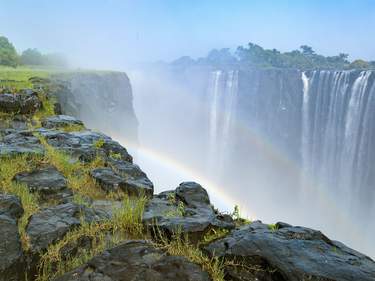
Chobe River Cruise & Victoria Falls
A luxurious river safari on the Chobe River in Botswana as well as a day at the fascinating Victoria Falls - this trip packs wildlife, nature and culture into one. Enjoy the beautiful Zambezi Queen houseboat and its luxurious surroundings on the trip of a lifetime.
Why visit ZImbabwe? Here are four reasons to start:
1. For world-class safari experiences and abundant wildlife
Zimbabwe is famous for its amazing wildlife and top-tier safari experiences. Hwange National Park, one of the largest national parks in Africa, boasts a vast population of elephants, along with lions, cheetahs, and African wild dogs. Another highlight is Mana Pools National Park, a UNESCO World Heritage Site where you can catch sight of hippos, crocodiles, and rare birds.
2. To see Zimbabwe’s landscapes
From the mist-covered peaks of the Eastern Highlands to the sprawling savannas of Matabeleland, Zimbabwe’s scenery is incredibly diverse and largely untouched by mass tourism. Whether you're looking to fish, canoe, or just relax, the country's rivers—like the Zambezi and Limpopo—offer perfect spots. Lake Kariba, one of the largest man-made lakes in the world, is ideal for houseboat trips, while the Chimanimani Mountains provide stunning hiking trails .
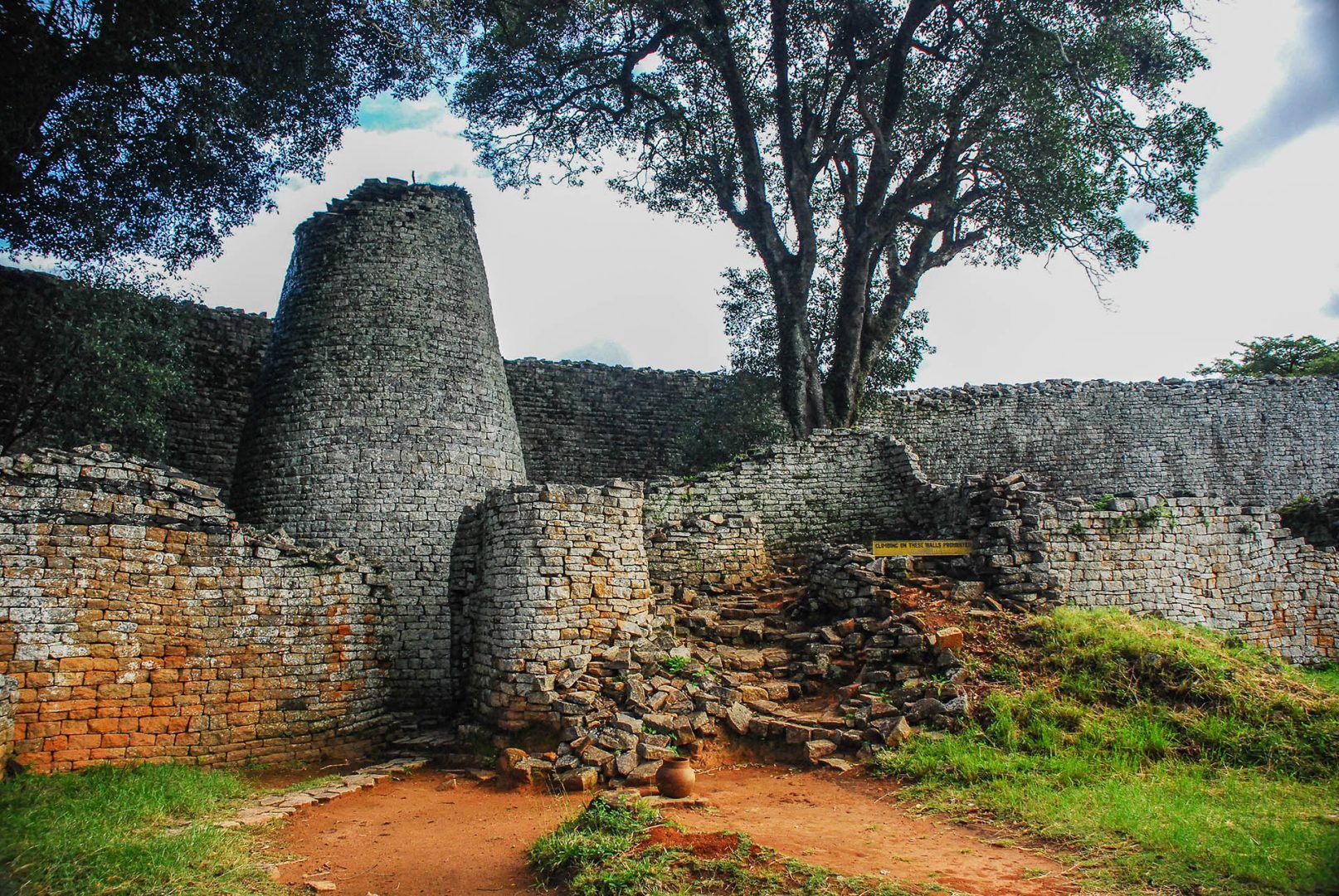
Great Zimbabwe ruins © Shutterstock
3. To experience Zimbabwe culture
One of the best things about visiting Zimbabwe is experiencing its warm, welcoming culture. The Shona and Ndebele people, in particular, are known for their rich traditions, which are often expressed through lively music, dance, and art. You can visit local villages to see these traditions in action and learn about Mbira music, a storytelling method through song. Zimbabwe is also famous for its stone sculptures, which reflect deep spiritual beliefs. Cultural festivals like the Harare International Festival of the Arts (HIFA) are great ways to experience the country’s artistic and cultural pride.
4. For adventure activities
For thrill-seekers , Zimbabwe won’t disappoint. Victoria Falls is not only a breathtaking natural wonder but also a hub for thrilling activities like bungee jumping, zip-lining over Batoka Gorge, and white-water rafting on the Zambezi River. Matobo National Park offers rock climbing, while the Zambezi Valley is perfect for canoe safaris.
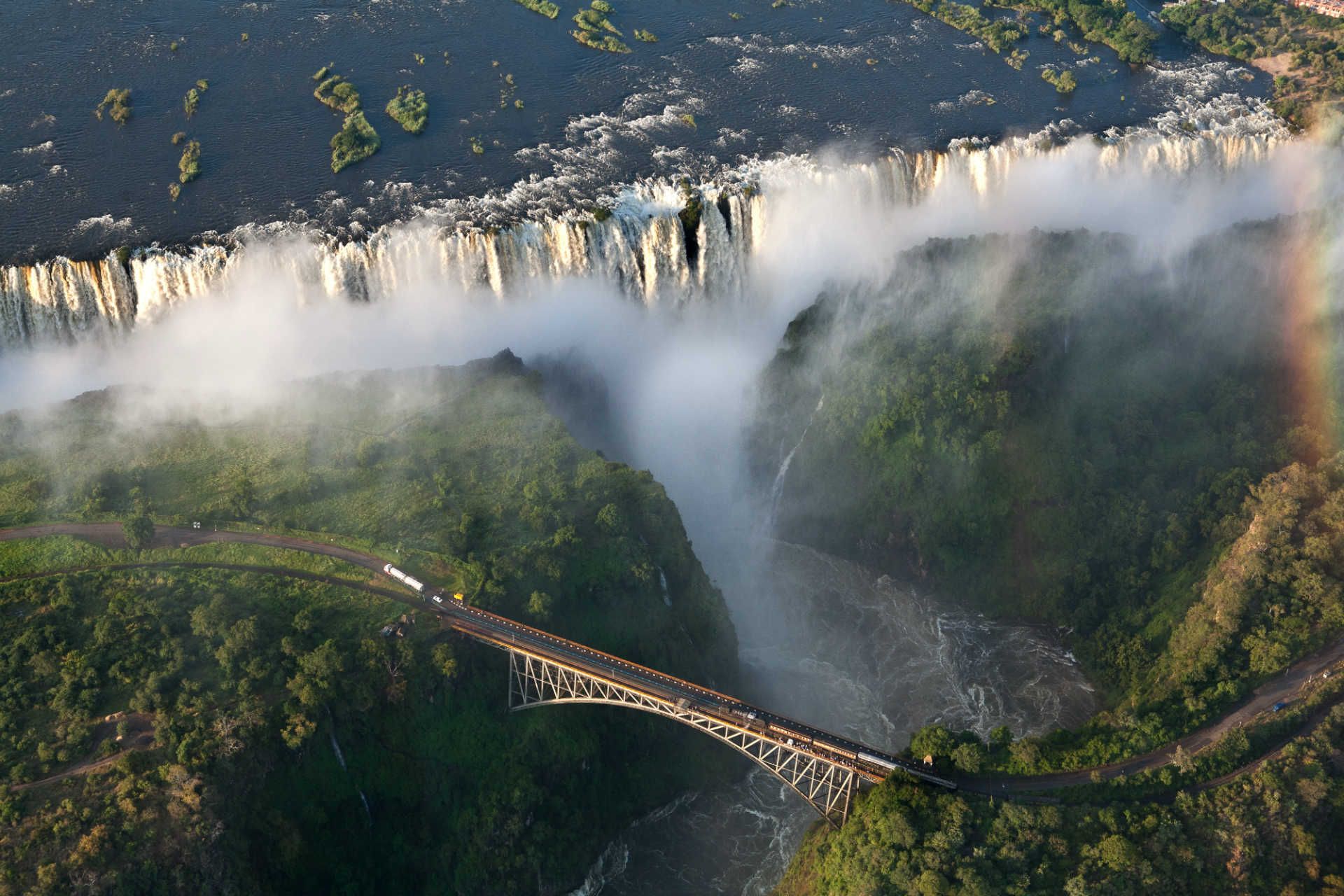
Victoria Falls, Zimbabwe © Shutterstock
There are plenty of things to do in Zimbabwe, but here are our top five places to visit:
#1: Victoria Falls
Victoria Falls is Zimbabwe’s most famous attraction, and for good reason. Known locally as Mosi-oa-Tunya, or "The Smoke That Thunders," it's one of the largest and most powerful waterfalls in the world, stretching over a mile wide and dropping 355 feet (108 meters) into the Zambezi Gorge. You can take in breathtaking views while walking along the trails, but for something more exciting, why not try a helicopter ride?
#2: Hwange National Park
As Zimbabwe’s largest wildlife reserve, Hwange National Park covers around 5,657 square miles (14,650 sq km) and is home to an amazing variety of wildlife, including more than 40,000 elephants. It's a paradise for wildlife lovers, with over 100 species of mammals and 400 species of birds. On game drives, you're likely to spot lions, buffalo, giraffes, and even the rare African wild dog. One unique feature of Hwange is its underground hides, where you can watch animals gather at waterholes without being seen.

Panthera leo in Hwange National Park, Zimbabwe © Shutterstock
#3: Great Zimbabwe
Step back in time with a visit to Great Zimbabwe, an ancient city that offers a glimpse into Africa’s rich history. This UNESCO World Heritage Site was once the capital of the Kingdom of Zimbabwe, thriving between the 11th and 15th centuries. The stone ruins, including the iconic Great Enclosure with its towering walls, are a masterpiece of early African architecture. A nearby museum adds more context, with displays of pottery, iron tools, and the famous Zimbabwe Bird—an important national symbol.
#4: Matobo National Park
Located in southwestern Zimbabwe, Matobo National Park is known for its stunning granite rock formations, called kopjes, shaped over millions of years. The park is a place of both natural beauty and spiritual significance, with ancient San rock art offering a window into early human history. Matobo is also a refuge for rhinos, and guided walking tours provide a rare chance to track black and white rhinos on foot.
#5: Mana Pools National Park
Mana Pools is one of Africa’s most remote and unspoiled wildlife areas, located along the banks of the Zambezi River. It’s a UNESCO World Heritage Site known for its large populations of elephants, hippos, and crocodiles. One of the park’s unique features is that you can go on self-guided walking safaris , giving you the freedom to explore the wilderness up close. Canoeing on the Zambezi offers a peaceful way to observe animals from the water.

Elephant bulls walking in the Zambezi river in Mana Pools National Park in Zimbabwe © Shutterstock
If you’re getting ready to head off to Zimbabwe, here are some tips to consider to make the most of your trip.
Getting there
If you're flying into Zimbabwe, Robert Gabriel Mugabe International Airport in Harare is your main gateway, with direct flights from cities like Johannesburg, Addis Ababa, and Dubai. For those heading straight to Victoria Falls, there’s also an international airport nearby, making your trip even smoother. If you prefer traveling overland, you can drive in from neighboring countries like South Africa and Zambia—just make sure to check road conditions and border requirements beforehand.
When to visit
The ideal time to explore Zimbabwe is during the dry season, from May to October. This is when wildlife gathers around water sources, giving you great opportunities for safari spotting. If you’re keen on walking safaris or canoeing, this is also the best time. Planning a trip to Victoria Falls? Aim for between February and April to catch the falls in full force right after the rainy season.

The picturesque rock formations of the Matobo National Park, Zimbabwe © Shutterstock
Travel requirements
For most nationalities, you’ll need a visa to enter Zimbabwe, which you can easily get on arrival or through their online eVisa system. Tourist visas generally allow you to stay for up to 30 days. Make sure your passport is valid for at least six months beyond your trip, and have proof of onward travel.
Health tips
Malaria precautions are a must, especially if you’re visiting during the rainy season or heading to areas like Victoria Falls and Hwange. Bring anti-malarial medication and insect repellent. It’s also wise to talk to your doctor about vaccines for hepatitis A, typhoid, and yellow fever. Stick to bottled or purified water to avoid any health issues, as tap water might not be safe to drink.
Planning your own trip? Prepare for your trip
Use Rough Guides' trusted partners for great rates
updated 07.10.2024
Ready to travel and discover Zimbabwe?
Get support from our local experts for stress-free planning & worry-free travels.
Arrange your personalized trip, hassle-free, with local travel experts
Plan with Local Travel Experts!

IMAGES
VIDEO